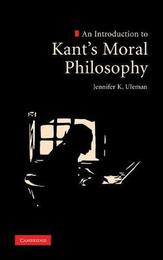
|
An Introduction to Kant's Moral Philosophy
Hardback
Main Details
| Title |
An Introduction to Kant's Moral Philosophy
|
| Authors and Contributors |
By (author) Jennifer K. Uleman
|
| Physical Properties |
| Format:Hardback | | Pages:200 | | Dimensions(mm): Height 235,Width 155 |
|
| Category/Genre | Ethics and moral philosophy |
|---|
| ISBN/Barcode |
9780521199629
|
| Classifications | Dewey:170.92 |
|---|
| Audience | | Tertiary Education (US: College) | | Professional & Vocational | |
|---|
|
Publishing Details |
| Publisher |
Cambridge University Press
|
| Imprint |
Cambridge University Press
|
| Publication Date |
21 January 2010 |
| Publication Country |
United Kingdom
|
Description
Immanuel Kant's moral philosophy is one of the most distinctive achievements of the European Enlightenment. At its heart lies what Kant called the 'strange thing': the free, rational, human will. This introduction explores the basis of Kant's anti-naturalist, secular, humanist vision of the human good. Moving from a sketch of the Kantian will, with all its component parts and attributes, to Kant's canonical arguments for his categorical imperative, this introduction shows why Kant thought his moral law the best summary expression of both his own philosophical work on morality and his readers' deepest shared convictions about the good. Kant's central tenets, key arguments, and core values are presented in an accessible and engaging way, making this book ideal for anyone eager to explore the fundamentals of Kant's moral philosophy.
Author Biography
Jennifer K. Uleman is Assistant Professor of Philosophy, Purchase College (State University of New York). She is the author of numerous articles and reviews.
Reviews'Uleman consistently states her aims in each chapter clearly, organizes discussions well, and poses questions to make her train of thought easy to follow. Her grasp of the details of Kant's moral philosophy as well as of how those details hang together to form a whole is rare and impressive. This work should prove to be very helpful to many students.' Lara Denis, Agnes Scott College 'This engaging book is a wonderful introduction to Kant's moral philosophy. It explains many of Kant's central concepts, such as those of will, freedom, maxims, and imperatives, clearly and succinctly. But the book also makes an argument that must be taken seriously by every scholar as well as student of Kant: that Kant's formulations of the categorical imperative collectively analyze what it is to make the realization of freedom the ultimate goal of human action. The book also beautifully shows how Kant unfolds the value of realizing our freedom without reducing his argument to the kind of empirical, psychological morality that Kant rejects. This is a wise, insightful work.' Paul Guyer, University of Pennsylvania
|